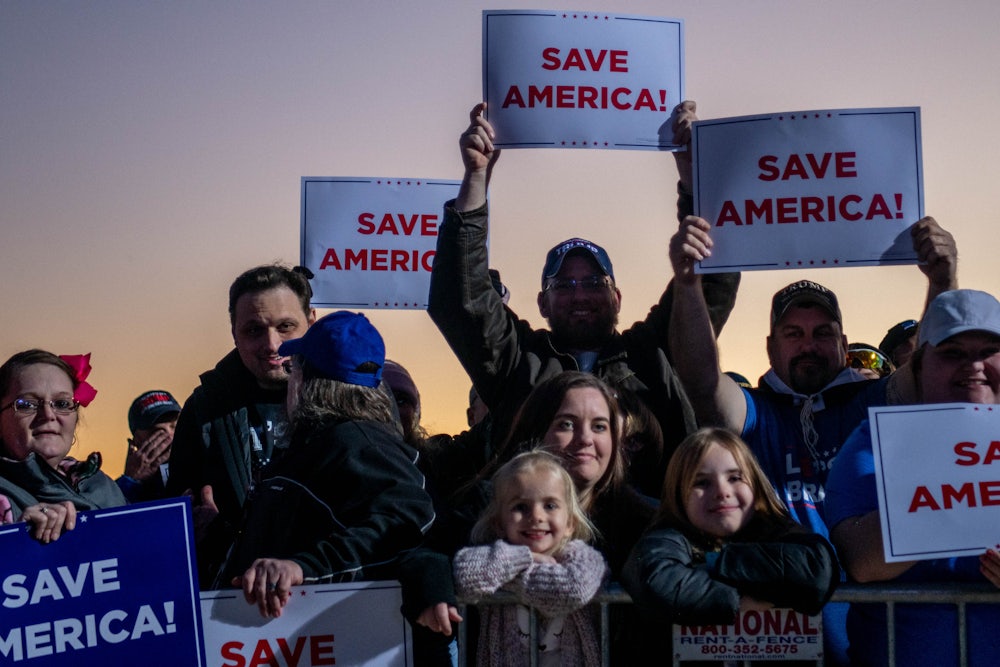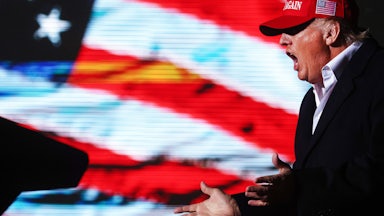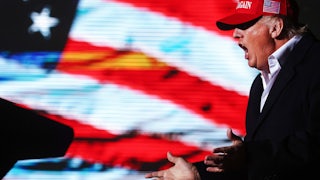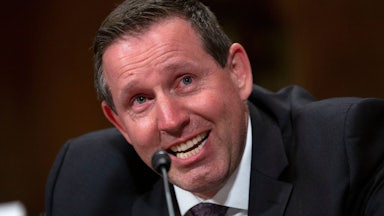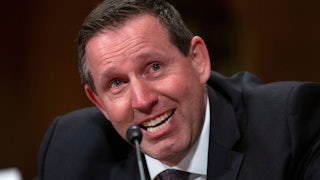Over a chaotic span of days this past weekend, Texas was the main stage for an increasingly indistinguishable group of political actors, those who form what remains of the Republican “establishment,” and the many strands of the far right, a joint production that has come to dominate the conservative movement. The right-wing jubilee kicked off with a “border security” summit last Thursday, attended by 12 state attorneys general, including Texas Attorney General Ken Paxton (who is still facing fraud charges). There were the expected Republican attacks on Joe Biden for, in their eyes, abandoning “the rule of law.” The host, Texas Governor Greg Abbott, unfurled a confusing social media panic about “the cartels in Mexico” allegedly using TikTok to “advertise” for human traffickers.
That was the “mainstream” event. Just 15 miles away was a three-day gathering focused on “border law enforcement and the direct connection to election integrity from a Biblical worldview,” as billed by organizers We Stand America. Speakers included Donald Trump’s former national security adviser and QAnon promoter Michael Flynn, as well as an Arizona secretary of state candidate, and concluded with a “border caravan” where, reportedly, attendees gathered at the wall, “some of them armed with long guns,” and sang “Amazing Grace.” At the same time, just a 20-minute drive away, the National Butterfly Center was closed for the weekend. It had already been subject to threats from far-right conspiracy theorists baselessly accusing it of involvement in sex trafficking, like those taunting allegations made in person by Republican congressional candidate from Virginia Kimberly Lowe, who also allegedly physically attacked the center’s director, Marianna Treviño-Wright, one week earlier.
And then, come Saturday night, entered Donald Trump himself. The former president’s scripted remarks played as even more extreme than others, not only for how near his rally was to the weekend’s self-appointed border “defense” activities. In his speech, Trump dangled pardons for those charged with offenses related to the January 6 insurrection should he become president in 2025, and yet again affirmed that he intended to overturn the results of the 2020 presidential election.
This weekend was suffused with the familiar atmosphere of paranoia that had marked the Trump White House years: free-flowing xenophobia and racism; law enforcement fetishization; fever dreams of vast voter fraud; fearful warnings that children were being held captive or slaughtered by immigrants operating as human traffickers. But there was something else: an open call to exact retribution on Black elected officials, an appeal to white terror. Trump called the prosecutors currently investigating him—for various alleged financial, real estate, and election wrongdoings—“radical” and “racist.” The prosecutors, Trump said, “in reality, they’re not after me. They’re after you, and I just happen to be the person that’s in the way.” He repeated himself and continued: “If these radical, vicious, racist prosecutors do anything wrong or illegal, I hope we are going to have in this country the biggest protest we have ever had, in Washington, D.C., in New York, in Atlanta, and elsewhere”—effectively singling out three Black prosecutors investigating him: Manhattan District Attorney Alvin Bragg; New York Attorney General Letitia James; and Fulton County, Georgia, District Attorney Fani Willis, who requested FBI protection following the former president’s derogatory and threatening remarks.
From the day he launched his campaign down an escalator, the Trump drone has been consistent: Criminals are out to get “us”; immigrants versus “America”; a threat to white innocence. In a directive to his supporters, Trump has now added to this litany: Black prosecutors doing “illegal” and “vicious” things to white people like him, like you. The reason for this, he added, was that this country—the one that would elect these members of law enforcement—was “corrupt.”
Like the xenophobic panic about immigration and sex trafficking, this is not a new kind of appeal but one that has deep roots in American history. And there is a particular twist in Trump’s latest rhetoric, the claim that only a corrupt country could elect Black people who would dare to investigate whites. Trump is riding the coattails of his forebears, those who violently undermined the possibility of a multiracial government with racist terror, the foes of Radical Reconstruction, who also cloaked their appeal to the maintenance of white supremacy in the language of fighting “corruption.”
In the years following the Civil War and the passage of the Thirteenth, Fourteenth, and Fifteenth Amendments—granting citizenship and the vote to formerly enslaved Black men—Americans elected hundreds of Black men to public office, from U.S. Congress and state legislatures to county prosecutors and judges. By historian Eric Foner’s count, in the South during Reconstruction, around 1,500 Black men were elected to state office and 185 to federal offices. Georgia sent its first Black member of Congress to Washington. Florida, Louisiana, Mississippi, and South Carolina elected Black secretaries of state. Of all these elected positions, nearly 400 were held by Black men who were formerly enslaved. “It’s the first time in this country, or really anywhere,” Foner has said, “that an interracial democracy was created.”
In response, white men wreaked wide-ranging violence. A member of the Georgia state legislature, Abram Colby, who was formerly enslaved, survived Ku Klux Klan attacks meant to end his political service. As he testified before a Congressional committee in 1872, Klansmen broke down his door, dragged him from bed in front of his wife and daughter, beat him for hours, and left him for dead. He told the committee, “Some are first-class men in our town. One is a lawyer, one a doctor, and some are farmers.” The attacks continued. “The Saturday night before the election I went to church. When I got home they just peppered the house with shot and bullets.” Not long after they were elected, Black public officials were assaulted and driven from office; the recently granted Black franchise was threatened from the ballot box with extreme and ongoing violence.
The Equal Justice Initiative has documented 34 mass lynchings during this era. During a march for Black voting rights in New Orleans in 1866, white mobs killed an estimated 33 Black people. In Eutaw, Alabama, in 1870, a white mob killed four people in an attack on a political meeting attended by Black and white residents. In Vicksburg, Mississippi, in 1874, a white mob killed an estimated 50 Black people after they had organized a protest against the removal of an elected Black sheriff. In Wilmington, North Carolina, in 1898, a violent coup carried out by white supremacists overthrew the local Black government. In a document titled “White Declaration of Independence,” the insurrectionists proclaimed, “We, the undersigned citizens … do hereby declare that we will no longer be ruled, and will never again be ruled by men of African origin.”
When I hear Trump attempt to rally a posse to Atlanta against a Black woman holding elected office, tell his followers that she holds illegitimate power over him, order them to protest against her “vicious” acts, in some ways, it resembles merely a continuation of a long terror campaign. The subtext is not subtle: Trump believes that power is fundamentally illegitimate and corrupt based solely on the fact of Black people holding it—never forget that he rose in Republican ranks thanks to his trumpeting of birtherism—a threat of presumed illegitimacy he then uses to mobilize white mass violence. There’s no sense in informing anyone that Trump’s invocation of law and order is a joke, when he openly defies the law and summons his flock to protect him from the consequences—in the very same speech in which he promised to pardon the people who attacked Capitol Hill Police officers assaulted on January 6. That doesn’t matter much when, to Trump, the law is white.
In her new book, Insurrection, the attorney and cultural critic Hawa Allan defines the term, in part, as “a mirror reflecting the ongoing and often bloody battle to fully incorporate black Americans into the citizenry of the United States.” By this, she is referring to those historic events legally designated so under the Insurrection Act, up to but not yet including January 6, but also to a more enduring condition, “a struggle that, in this light, appears more like an open-ended civil war than a history of ‘progress.’” We aren’t doubling back over the past. We aren’t on the precipice of some new threat to democracy. This violence remains with us in the present. The insurrection never ended.
This story has been updated.
